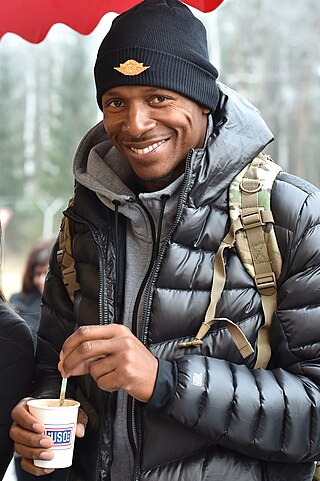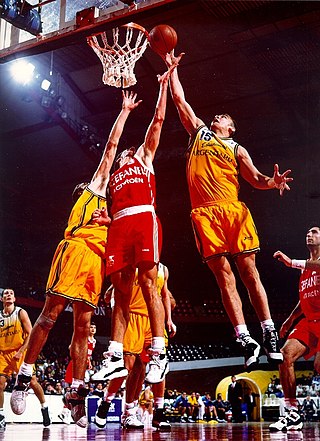Related Research Articles

Gary Dwayne Payton is an American former professional basketball player who played the point guard position. Widely considered one of the greatest point guards of all time, he is best known for his 13-year tenure with the Seattle SuperSonics, where he holds franchise records in assists and steals. He also played with the Milwaukee Bucks, Los Angeles Lakers, Boston Celtics, and Miami Heat. Payton won an NBA championship with the Heat in 2006. Nicknamed "the Glove" for his defensive abilities, Payton was inducted into the Naismith Basketball Hall of Fame in 2013. In October 2021, Payton was named to the NBA 75th Anniversary Team.

Walter Ray Allen Jr. is an American former professional basketball player. He played 18 seasons in the National Basketball Association (NBA) and was inducted into the Naismith Memorial Basketball Hall of Fame as a player in 2018. Allen is widely considered to be one of the greatest three-point shooters of all-time, and he held the record for most three-pointers made in a career from 2011 until 2021, when he was surpassed by Stephen Curry.
Dale Ellis is an American former professional basketball player who played in the National Basketball Association (NBA). At various points in his career, Ellis held the record for the most career 3-point field goals made, until Reggie Miller surpassed him. His 1,719 career made three-pointers ranked 2nd in NBA history at the time of his retirement.

Jack Wayne Sikma is an American former professional basketball center. He was a seven-time NBA All-Star with the Seattle SuperSonics, who drafted him in the first round with the eighth overall pick of the 1977 NBA draft. In 1979, he won an NBA championship with Seattle. Sikma finished his playing career with the Milwaukee Bucks. He was elected to the Naismith Basketball Hall of Fame in 2019.

The 1996 NBA Finals was the championship series of the National Basketball Association (NBA)'s 1995–96 season, and the culmination of the season's playoffs. The Western Conference champion Seattle SuperSonics (64–18) played the Eastern Conference champion Chicago Bulls (72–10), with the Bulls holding home court advantage. The teams' 136 combined regular season wins shattered the previous record of 125, set in 1985 between the Los Angeles Lakers who won 62 games and the Boston Celtics who won 63 games in the past regular season. The series, the 50th NBA finals in league history, was played under a best-of-seven format. This was the first championship in the Chicago Bulls' second three-peat.

In basketball, a rebound, sometimes colloquially referred to as a board, is a statistic awarded to a player who retrieves the ball after a missed field goal or free throw.
Francis Anthony Brickowski is an American former professional basketball player, formerly in the National Basketball Association (NBA).
The 1995–96 NBA season was the Bulls' 30th season in the National Basketball Association. During the off-season, the Bulls acquired controversial All-Star forward and rebound-specialist Dennis Rodman from the San Antonio Spurs, and signed free agents Randy Brown and James Edwards. At midseason, the team signed John Salley, who was previously released by the expansion Toronto Raptors; Rodman, Edwards and Salley were all teammates on the Detroit Pistons during the "Bad Boy" era, where they won two straight championships in 1989 and 1990. The Bulls had the best team offensive rating and the best team defensive rating in the NBA.
The 1977–78 NBA season was the team's 17th season in the NBA and their 5th season in the city of Washington, D.C. It would prove to be their most successful season, as they would win their first and only NBA championship as of 2022. In the NBA Finals, they defeated the Seattle SuperSonics in seven games.
The 1995–96 NBA season was the 28th season for the Seattle SuperSonics in the National Basketball Association. During the off-season, the Sonics acquired shooting guards Hersey Hawkins and David Wingate from the Charlotte Hornets, and re-acquired Frank Brickowski from the Sacramento Kings. The team returned to what had now become the KeyArena at Seattle Center after spending the previous season in the Tacoma Dome, while the KeyArena was being renovated. After two consecutive playoffs appearances losing in the first round, the Sonics got off to a 9–6 start in November, but later on posted a 14-game winning streak between February and March, then won nine straight games between March and April. The team held a 34–12 record at the All-Star break, then won 30 of their final 36 games afterwards to finish the regular season with a franchise best 64–18 record, surpassing the record from the 1993–94 season, and earned their third number one seed in the Western Conference in franchise history. They also posted a 38–3 record at home, which was second best in the league.
The 1991–92 NBA season was the 24th season for the Seattle SuperSonics in the National Basketball Association. After a 7–3 start to the season, head coach K. C. Jones was fired with the team holding an 18–18 record. After splitting four games under interim coach Bob Kloppenburg, the Sonics hired George Karl, who returned after a four-year absence from coaching in the NBA. Under Karl, the SuperSonics held a 24–24 record at the All-Star break, and finished the season fourth in the Pacific Division with a 47–35 record, reaching the playoffs as the number 6 seed in the Western Conference.
The 1996–97 NBA season was the 29th season for the Seattle SuperSonics in the National Basketball Association. The SuperSonics entered the season as runners-up in the 1996 NBA Finals, having lost to the Chicago Bulls in six games. During the off-season, the team signed free agents Jim McIlvaine, Craig Ehlo, and Larry Stewart, and then later on signed former All-Star forward Terry Cummings in January. Coming off their trip to the NBA Finals, the Sonics remained as one of the elite teams in the Western Conference posting an 11-game winning streak after losing two of their first three games. They later on posted a nine-game winning streak in January, then won seven straight games in February, and held a 32–15 record at the All-Star break. The Sonics won their third Division title in four years with a 57–25 record, and entered the playoffs as the #2 seed in the Western Conference. The SuperSonics had the sixth best team defensive rating in the NBA.
The 1997–98 NBA season was the 30th season for the Seattle SuperSonics in the National Basketball Association. In the off-season, the Sonics acquired All-Star forward Vin Baker from the Milwaukee Bucks in a three-team trade. The team also re-acquired former Sonics star and sharp shooter Dale Ellis from the Denver Nuggets, and signed free agents Jerome Kersey, and Greg Anthony. The Sonics got off to a fast start with a 13–3 record after a 7-game winning streak in November, despite losing Kersey to a stress fracture in his left foot as he only played just 37 games. The team posted an 8-game winning streak between December and January winning 29 of their first 35 games, then later on holding the league's best record before the All-Star break with a 37–10 record. as they finished first place in the Pacific Division tied with the Los Angeles Lakers with a 61–21 record.
This page details the all-time statistics, records, and other achievements pertaining to the Chicago Bulls.
References
- ↑ NAIA. "NAIA Championship History" (PDF). Archived from the original (PDF) on May 23, 2011. Retrieved March 24, 2016.
- ↑ "Savage Storm Records" . Retrieved April 29, 2020.
- ↑ "NBA & ABA Career Leaders and Records for Total Rebound Pct". www.basketball-reference.com. September 29, 2023.
- ↑ "NBA & ABA Single Season Leaders and Records for Defensive Rebound Pct". www.basketball-reference.com. September 29, 2023.
- ↑ The Los Angeles Times . February 23, 1999. Page D6.
- ↑ The Los Angeles Times . February 23, 1999. Page D6.